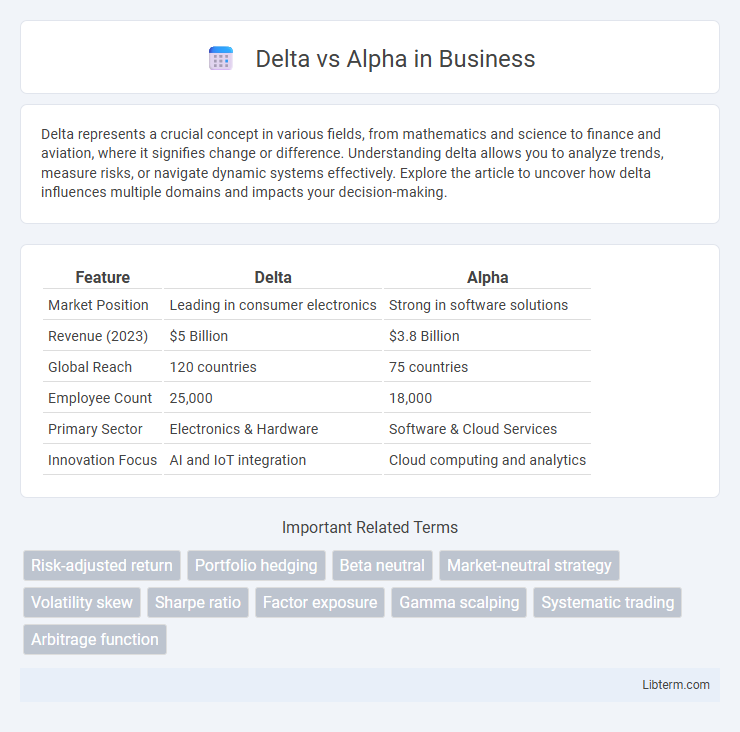Delta represents a crucial concept in various fields, from mathematics and science to finance and aviation, where it signifies change or difference. Understanding delta allows you to analyze trends, measure risks, or navigate dynamic systems effectively. Explore the article to uncover how delta influences multiple domains and impacts your decision-making.
Table of Comparison
| Feature | Delta | Alpha |
|---|---|---|
| Market Position | Leading in consumer electronics | Strong in software solutions |
| Revenue (2023) | $5 Billion | $3.8 Billion |
| Global Reach | 120 countries | 75 countries |
| Employee Count | 25,000 | 18,000 |
| Primary Sector | Electronics & Hardware | Software & Cloud Services |
| Innovation Focus | AI and IoT integration | Cloud computing and analytics |
Introduction to Delta and Alpha
Delta Air Lines and Alpha Aviation represent two distinct sectors of the aviation industry, with Delta serving as a major American global airline and Alpha Aviation specializing in training and maintenance services. Delta operates a vast international network, offering extensive passenger and cargo transport, while Alpha focuses on pilot training, aircraft maintenance, and aviation consultancy. Both companies play critical roles in different aspects of aviation, with Delta emphasizing commercial airline operations and Alpha concentrating on technical and educational support.
Defining Delta and Alpha
Delta and Alpha are critical performance metrics in finance and trading; Delta measures the sensitivity of an option's price to changes in the underlying asset's price, indicating how much the option's value will move for a $1 change in the asset. Alpha represents the excess return of an investment relative to a benchmark index, reflecting the value added by active portfolio management beyond market movements. Understanding Delta helps in managing option risk, while Alpha gauges the skill in generating returns above market expectations.
Historical Origins and Usage
Delta, the fourth letter of the Greek alphabet, originated from the Phoenician letter "dalet" and has been used historically to denote change or difference in mathematics and science. Alpha, the first letter of the Greek alphabet, derives from the Phoenician "aleph" and symbolizes beginnings, dominance, or the primary status in various contexts such as linguistics and finance. Both letters have profound historical significance, with Delta commonly representing variation and Alpha signifying primacy in classical and modern usage.
Key Differences Between Delta and Alpha
Delta and Alpha variants of the SARS-CoV-2 virus differ significantly in transmissibility and immune evasion. The Delta variant exhibits higher contagion rates and partial resistance to neutralizing antibodies compared to the Alpha variant, leading to increased breakthrough infections. Genetic mutations in the spike protein of Delta enhance its binding affinity to human ACE2 receptors, while Alpha carries distinct mutations that primarily increased transmissibility but with less impact on immune escape.
Applications in Financial Markets
Delta measures the sensitivity of an option's price to changes in the underlying asset's price, crucial for hedging strategies and risk management in financial markets. Alpha represents the excess return of an investment relative to a benchmark index, widely used to assess portfolio manager performance and investment strategy effectiveness. Both metrics are essential: Delta guides options trading and dynamic hedging, while Alpha evaluates the value added by active management in equity and hedge fund portfolios.
Delta vs Alpha in Risk Management
Delta measures the sensitivity of an option's price to changes in the underlying asset's price, serving as a key risk metric for directional exposure in risk management. Alpha represents the excess return generated by an investment relative to its benchmark, indicating the value added by active management rather than market movements. Effective risk management prioritizes delta to control market directional risks, while alpha assessment helps evaluate performance after accounting for risk.
Real-World Examples
Delta variant caused significant outbreaks in India during 2021, leading to overwhelmed healthcare systems and increased hospitalizations globally. Alpha variant initially spread rapidly in the United Kingdom, resulting in stricter lockdown measures and accelerated vaccine rollouts. Real-world data shows Delta's higher transmissibility and severity compared to Alpha, influencing public health responses worldwide.
Advantages and Disadvantages
Delta variant exhibits higher transmissibility than Alpha, resulting in faster community spread and increased hospitalization rates. Alpha variant, while less contagious, demonstrates slightly better vaccine sensitivity, allowing more effective immune response from existing vaccines. Both variants pose challenges for public health, but Delta's ability to partially evade immunity makes it more difficult to control in vaccination campaigns.
Common Misconceptions
Delta and Alpha variants of SARS-CoV-2 are often confused regarding their transmissibility and severity; however, Delta demonstrates significantly higher contagiousness and a greater risk of severe outcomes compared to Alpha. Misconceptions include the belief that Alpha was more deadly, though data shows Delta caused more hospitalizations and faster spread globally. Both variants share mutations in the spike protein, but Delta's unique mutations contribute to its enhanced ability to evade immune responses and increase viral load.
Conclusion and Future Trends
Delta variant demonstrates higher transmissibility and immune evasion compared to Alpha, challenging current public health responses. Vaccine adaptations and booster campaigns are critical to counter emerging variants with similar or enhanced mutation profiles. Ongoing genomic surveillance and real-time data analysis remain essential for predicting variant evolution and guiding future pandemic strategies.
Delta Infographic

 libterm.com
libterm.com